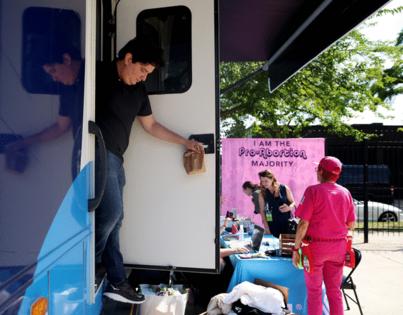Planned Parenthood offers free abortions, vasectomies at mobile clinic near DNC to 'show what is possible'
Published in Family Living
CHICAGO — A few blocks from the Democratic National Convention, Planned Parenthood is offering free medication abortions and vasectomies at its mobile health clinic to demonstrate “what is possible when policies truly support accessible reproductive health care,” according to the agency.
Physicians were providing abortions and vasectomies by appointment on Monday in the West Loop and said they planned to continue doing so Tuesday. As of Monday evening, no appointments on Tuesday were available. The Chicago Abortion Fund has also been distributing free emergency contraceptives at the site.
“Tens of thousands of people are going to be traveling to Chicago (for the DNC),” said Dr. Colleen McNicholas, chief medical officer at Planned Parenthood Great Rivers, which covers the St. Louis region and southwest Missouri. “I’m excited that we are able to demonstrate for the world in a state like Illinois — where we have supportive policies — we can do these things that are a little bit more creative.”
The pro-reproductive rights event comes as abortion access is expected to take center stage at the DNC as well as the November presidential election. Democratic nominee Kamala Harris has been outspoken about her intent to restore federal abortion rights, blaming the 2022 overturning of Roe v Wade on Republican presidential nominee, former President Donald Trump.
Gov. JB Pritzker’s organization to promote abortion rights, Think Big America, is slated to host a panel Wednesday called “Freedom on the Ballot: The 2024 Abortion Ballot Initiative Landscape.” Pritzker and leaders from Personal PAC, the Fairness Project, Reproductive Freedom for All and Planned Parenthood Actions Fund are scheduled to take part.
At the mobile clinic site patients streamed in and out of the 37-foot retrofitted recreation vehicle for appointments Monday afternoon.
Before his procedure, patient Marcus Aguinaga said the concept of the mobile health clinic seemed “wild” to him.
But the 27-year-old Chicago resident said he has wanted to get a vasectomy since 2020 but the procedure was cost-prohibitive; Planned Parenthood officials said vasectomies typically cost about $800 out-of-pocket and medication abortions are usually around $500.
Aguinaga said he moved here about a year ago from Texas, where he’d watched abortion restrictions increase for several years.
“If they’re going to make … health care so difficult, I’d rather just be preventative,” he said.
After the procedure, Aguinaga said he felt “relief.”
“I felt very taken care of,” he added.
The event during the DNC was the first time the mobile clinic was used in Illinois, though it has been used elsewhere, McNicholas said.
Planned Parenthood officials had announced plans for the vehicle after the fall of Roe, envisioning it as a more nimble way to travel and reach patients. The vehicle includes a small waiting room, bathroom and two exam rooms; physicians say it was designed to replicate a patient experience similar to a brick-and-mortar health center with the ability to travel and meet patients in more convenient locations.
About a dozen anti-abortion protesters gathered around a fence near the mobile clinic, holding posters with photos of aborted fetuses and slogans such as “every life matters.”
Protester Caroline Taylor Smith, executive director of the Washington, D.C.-based Progressive Anti-Abortion Uprising, called the mobile clinic event “shameful.”
“They are trivializing something that’s very personal, very difficult and very hurtful for a lot of people,” she said.
“God hates hands that shed innocent blood,” another anti-abortion demonstrator shouted. “The blood of the children you helped shed will testify against you.”
Since the end of Roe, 14 states — including Missouri — have all but banned terminating a pregnancy and several others have passed severe gestational restrictions.
Yet that could change during the November election. Missouri is one of at least a half-dozen states where residents will be voting on abortion rights: If approved by a majority of Missouri voters, a ballot measure for a constitutional amendment guaranteeing the right to abortion could reverse the statewide ban that went into effect when Roe fell.
Seven states have had ballot measures on abortion rights since 2022; in all cases, voters have favored abortion rights.
The number of out-of-state abortions in Illinois skyrocketed the year Roe was overturned. Nearly 17,000 abortion patients traveled here from other states in 2022, a 49% increase over the previous year, according to the Illinois Department of Public Health.
Since Roe’s end, the Chicago Abortion Fund received a huge increase calls for financial and logistical support from abortion patients; requests for help have recently surged again, in part due to increasing abortion restrictions nationwide, said Qudsiyyah Shariyf, deputy director of the Chicago Abortion Fund.
In neighboring Iowa, a law barring most abortions after about six weeks — before many patients even realize they’re pregnant — went into effect in late July. Terminating a pregnancy had previously been legal in Iowa up to 20 weeks gestation. A Florida ban on most abortions after six weeks also went into effect in May.
From January to June this year, the nonprofit received on average about 1,000 requests for assistance each month; but in July, the number rose to 1,700, Shariyf said.
“I think the message is that we need a long-term strategy to secure not only abortion access but full-spectrum reproductive freedom for all people,” Shariyf said.
_____
©2024 Chicago Tribune. Visit chicagotribune.com. Distributed by Tribune Content Agency, LLC.










Comments